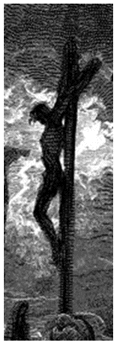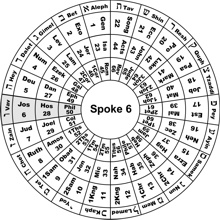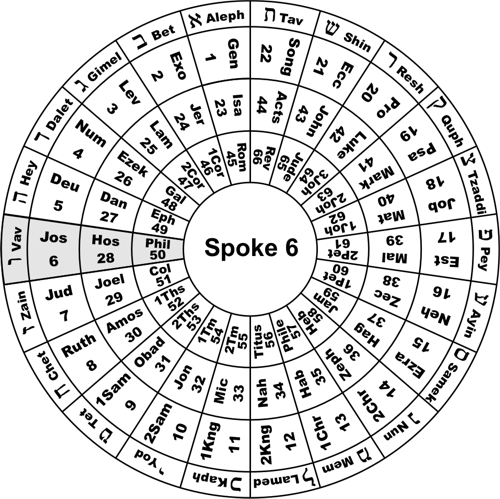Philippians: God in the likeness of Man
Let this mind be in you, which was also in Christ Jesus: Who,
being in the form of God, thought it not robbery to be equal with God:
But made himself of no reputation,
and took upon him the form of a servant, and was made in the likeness of men:
And being found in fashion as a man, he humbled himself, and became obedient unto death, even the
death of the cross. Wherefore God also hath highly exalted him, and given him a name
which is above every name: That at the name of Jesus every knee should bow, of things in heaven,
and things in earth, and things under the earth; And that every tongue should confess that
Jesus Christ is Lord, to the glory of God the Father.
Philippians 2:5ff (Spoke 6, Cycle 3)

As discussed at length above, God established the Number 6 as the Number of Man.
This is the universal consensus of Biblical scholars and has been written about so much over the last two millennia of Church history
that there is no need to cite the endless sources. It is therefore a great wonder to behold the doctrine of
the true humanity of Jesus Christ joined with the doctrine of His Divinity
here in Philippians on Spoke 6. It is the premier passage in all the Bible that explicitly states
the union of God and Man in Christ Jesus. It reveals the ultimate spiritual meaning of the
Sixth Letter, Vav, and in so doing, the Divine design of yet another Spoke upon the pattern of the Alphabet.
Note the thematic symmetry; Man was created in the likeness of God on the Sixth Day
just as Philippians declares God's incarnation in the likeness of Man on the Sixth Spoke of the
Bible Wheel.
The passage above moves so quickly from Christ's humiliation and death on the Cross to
His subsequent glory that it would be all too easy to overlook the depth of pathos – the unspeakable horror – implicit
in the incarnation, suffering, and death of the wholly righteous Lord of History ΑΩ/את
in our sin-soaked world. The Book of Hosea corrects for that, as we shall presently see.
The Humiliation of God (Hosea Philippians) Philippians)
Then said the LORD unto me, Go, show your love to your wife again,
though she is loved by another and is an adulteress, Love her as the Lord loves the children of
Israel, who look to other gods, and love raison cakes [of the pagans]. So I bought her to
me for fifteen pieces of silver, and for an homer of barley, and an half homer
of barley: And I said unto her, Thou shalt abide for me many days;
thou shalt not play the harlot, and thou shalt not be for another man: so will I also be for thee.
Hosea 3:1ff (Spoke 6, Cycle 2)
One of the most difficult ideas to get through to the human heart is the depth of pathos entailed in
the sacrifice of Jesus Christ. This is the purpose of the Book of Hosea;
Scripture paints no clearer picture of the utter degradation our High Priest suffered for us when He humbled
Himself to the point of death on the Cross. Victor Shepherd, Professor of Systematic and Historical Theology at Tyndale,
explained this in his sermon,
The Passion of God  (emphasis added): (emphasis added):

Centuries before Good Friday the prophet Hosea learned about that humiliation which
God's love brings to God. Hosea learned this through the humiliation his love for
his wife brought him. Hosea's wife, Gomer, traipsed off to the marketplace and sold herself.
Pregnancy, of course, is an occupational hazard of prostitution, and Gomer bore three
children who weren't Hosea's. When Gomer was sufficiently used up that her market-value
was all but eroded and she thought she might as well return home (at least she would be fed there)
Hosea went down to the marketplace, endured the taunts and crude jokes
of the ruffians and
vulgar louts who lounged around there, and paid fifteen shekels to get his wife out
of their clutches. Fifteen shekels was half the price of a slave! Why did Hosea endure such humiliation?
Because he loved his wife, loved her regardless of the cost to himself, loved her regardless
of the face which couldn't be saved. Thereafter Hosea
preached about a divine love which loves to the point of public humiliation.
Hosea purchased his harlot wife to redeem her from the bondage of her sin, just as the Lord Jesus
purchased His Church when He was nailed to the Cross. All these ideas have been
seen before. The Reverend Peter Smit linked the primary elements of Philippians 2 with
Hosea's humiliation in his Christmas 1999 sermon,
Our God of Grace  : :
Hosea loved Gomer to show us how much God loves us.
Jesus suffered the humiliation of his incarnation, rejection and finally
death on a cross to not only secure our salvation, but to show us just how much God loves us.
Through the Cross, God completely joined Himself to us, bearing our sin unto death so we
might live with Him forever. In this, He fulfilled His role as our High Priest so He could,
as implicitly prophesied by Leah at the birth of Levi, join us to God as an adulterous woman
to her estranged husband. And as is typical of the supreme style of God's Word, He
promised our redemption in the very Book that so vividly exposes the revolting filth of our sin (Hosea 2:16ff):
And it shall be at that day, saith the LORD, that thou shalt call me Ishi [my husband] ...
And I will betroth thee unto me for ever; yea, I will betroth thee unto me in righteousness, and
in judgment, and in lovingkindness, and in mercies. I will even betroth thee unto me in faithfulness:
and thou shalt know the LORD.
|



